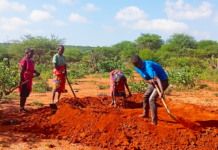By Nina Mitch
The Government of Kenya has received 205 USD million loan from the African Development Bank to support efforts in responding to the new COVID-19 pandemic and mitigate the related economic, health, and social impacts.
The loan will extend additional resources to Kenya as the country takes steps to contain the spread of the pandemic and deal with its unprecedented impact. It follows a request by the Government of Kenya, as part of its COVID-19 Emergency Response intervention, to help contain the scourge.
The Bank’s support will strengthen the national health system to effectively respond to the pandemic, build economic resilience, and ensure a quick recovery. The Bank’s intervention will also be used to support the poor and vulnerable people who have been negatively affected by the pandemic.

“We are very pleased to join other development partners in supporting the Government of Kenya’s efforts in mitigating the financial impact of the pandemic, especially in terms of the country’s expenditure in the health, social and economic sectors. The next step will focus on helping build resilience for post-COVID-19,” said the Bank’s Acting Director-General for East Africa, Nnenna Nwabufo.
Since Kenya’s first COVID-19 infection was confirmed on 12 March 2020, cases have risen to over 1,000, while the number of recoveries and deaths are 375 and 50, respectively, as of 22 May 2020. The pandemic is placing significant pressure on an already stretched healthcare system. It has disrupted supply chains and caused job losses in the tourism, hospitality, horticulture, and airline industries, among others.
In addition, informal and self-employed workers have also lost their livelihoods due to the impact of the pandemic.
The government’s response to the pandemic has been swift and multi-faceted, covering a range of measures including health-related containment measures, protection of the poor and vulnerable, provision of support to local businesses, and sustaining jobs. The Bank’s intervention, through the COVID-19 Emergency Response Support Program, is designed to support these measures.
As a result of demand and supply shocks, Kenya’s real GDP growth is projected to fall to between 0.6 and 1.4 percent from the initial 2020 projection of 6 percent.
In April, the Bank extended an emergency grant to help countries in the East and the Horn of Africa, including Kenya, that are contending with swarms of locusts that are threatening food security. Kenya is facing its worst swarms in 70 years. In Ethiopia and Somalia, the outbreak is the worst in 25 years.














